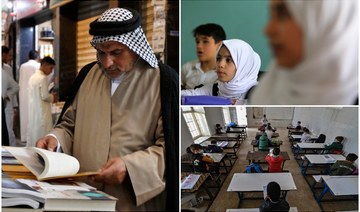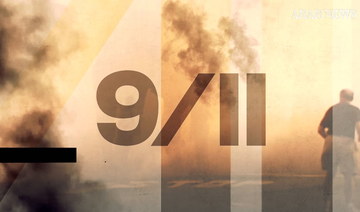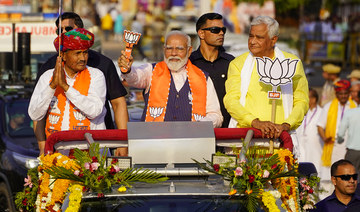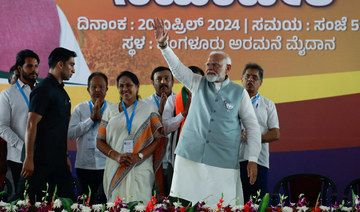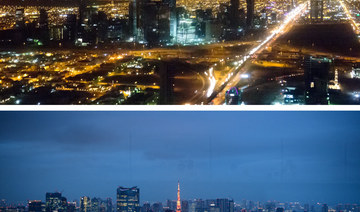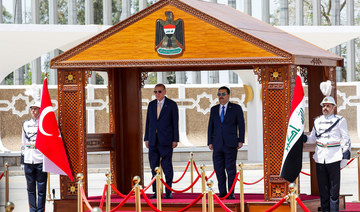WASHINGTON: Around New York City in the weeks after the Sept. 11 attacks, as an eerie quiet settled over ground zero, South Asian and Arab men started vanishing.
Soon, more than 1,000 were arrested in sweeps across the metropolitan area and nationwide. Most were charged only with overstaying visas and deported back to their home countries. But before that happened, many were held in detention for months, with little outside contact.
Twenty years later, in the aftermath of all the remembrances and memorials to the events of 9/11, little attention has been paid to the fate of these men and their families, collateral damage of a horrific terrorist act and the hysteria it spawned.
Fahd Ahmed, executive director of the immigrant advocacy group Desis Rising Up and Moving, said after the attacks, his group “started getting calls from women saying, ‘Last night, law enforcement busted into our apartment and took my husband and my brother.’ Children calling us and saying, ‘My father left for work four days ago and he hasn’t come home, and we haven’t heard anything.’”
“There were people who were just disappearing from our communities,” he says, “and nobody knew what was happening to them or where they were going.”
They were, according to the 9/11 Commission report, arrested as “special interest” detainees. Immigration hearings were closed, detainee communication was limited and bond was denied until the detainees were cleared of terrorist connections. Identities were kept secret.
A review conducted by the Justice Department’s Office of the Inspector General said its policy meant a significant percentage of the detainees stayed for months despite immigration officials questioning the legality of the prolonged detentions and even though there were no indications they were connected to terrorism.
Although many of those who were held had come into the US illegally or overstayed visas, it was unlikely they would have been pursued if not for the attack investigation, the report said.
The “blunderbuss approach” of rounding up Muslims and presuming there would be terrorists among them was “pure racism and xenophobia in operation,” says Rachel Meeropol, senior staff attorney with the Center for Constitutional Rights, who filed a lawsuit in 2002 on behalf of several of the men and continues to fight for additional plaintiffs to this day.
Yasser Ebrahim, an original plaintiff in the lawsuit, was at a shop in his New York neighborhood and noticed people intently watching the television. “I saw these images on the screen, and for a moment there was like some kind of a movie or something,” he says. “I couldn’t believe what I was seeing.”
He had been in the United States since 1992 and enjoyed his life. “I loved everything about America,” he said by Zoom from Egypt.
On Sept. 30, 2001. Federal agents showed up at his door in Brooklyn, New York. Ebrahim thought the immigration matter would be straightened out quickly, or he would be deported. He remained in custody until the following June.
For three months, his family did not know what happened to him or his brother. Even then there was little outside communication. And some officers at the facility in Brooklyn were physically and verbally abusive. It was months before he saw his brother. “There was the general feeling that we’re going to be here forever,” he says.
Ebrahim’s brother was deported first.
When Ebrahim was finally allowed to leave, he was given clothes several sizes too big and placed on a plane but without being told the destination. The plane went to Greece and after spending a night in the custody of Greek authorities, he boarded a flight for Cairo.
In 2009 he and four others, including his brother, reached a $1.26 million settlement on the lawsuit. Though not an apology, he says, “we thought it was sort of admitting that something wrong was done to us.”
Umair Anser, was 14 and living in Bayonne, New Jersey, when he and math classmates watched the twin towers fall on a classroom television.
Less than a month later he came from school and found a nearly catatonic mom and a ransacked home. His father, Anser Mehmood, was gone, along with the family’s computers.
“We didn’t know where our father was for the next three months,” Anser said.
When the family did see him again, it was a different man. “He was so weak … I couldn’t see my dad like that,” Anser said.
With their father gone, there was no financial support for the family. Anser and his brothers were bullied at school; neighbors harassed them at home. It became untenable and the family returned to Pakistan, leaving Mehmood behind, in jail.
Mehmood eventually pleaded guilty to working with an unauthorized Social Security number and was sentenced to eight months in prison. He was transferred to Passaic County Jail before finally being deported to Pakistan on May 10, 2002, where the family now lives.
Joshua Dratel, co-chair of the National Association of Criminal Defense Lawyers’ national security committee, says the detentions are a foundational piece of something troubling — an acceptance of more invasive law enforcement for protection from terrorists.
Searches at airports, in buildings, even on subways: “These are things that were once exceptional and extraordinary, and now the exception has become the norm. I think that has put us in a position of vulnerability to more of it and a more malevolent version of it.”
Shirin Sinnar, a law professor at Stanford University, says the extreme measures taken after 9/11 have been normalized to the point that “now we don’t even talk about them. They’ve just become part of the kinds of surveillance and deprivation of rights and profiling that we expect to see.”
The positive, she says: More people seem willing to challenge that.
To a degree, that is true. Attitudes have trended toward people being more wary of the government’s counterterrorism efforts.
But a recent poll by The Associated Press-NORC Center for Public Affairs Research shows that a majority of Americans, 54 percent, still believe it is sometimes necessary to sacrifice rights and freedom to fight terrorism.
The long-running lawsuit in which additional plaintiffs were added after the first five were awarded a settlement has continued. It has ricocheted through the court system with mixed results, including a 2017 stop at the Supreme Court. Last month, a federal district court judge in Brooklyn dismissed the lawsuit.
Meeropol says the initial settlement was proof that the plaintiffs had a compelling case. She says no decision has been made yet on an appeal. That leaves a striking fact: Nearly 20 years later, no individuals have been held accountable for how the detainees were treated, she says.
Ebrahim, now 49, and owner of a company that provides outsource service, including coding, to other companies, said now, he would consider bringing his teenage son to New York City to see sights and sounds that he found “charming.”
But, he has advice for US citizens: “Never twist the Constitution again. What makes America America is the freedom, and the Constitution.”
Muslims recall questionable detentions that followed 9/11
https://arab.news/2xznc
Muslims recall questionable detentions that followed 9/11

- Over 1,000 Arabs and South Asians disappeared and were later deported from the US after the 9/11 attacks
- A senior lawyer said the detentions were 'pure racism and xenophobia in operation'
Belgian agency aid worker dies in Gaza — minister
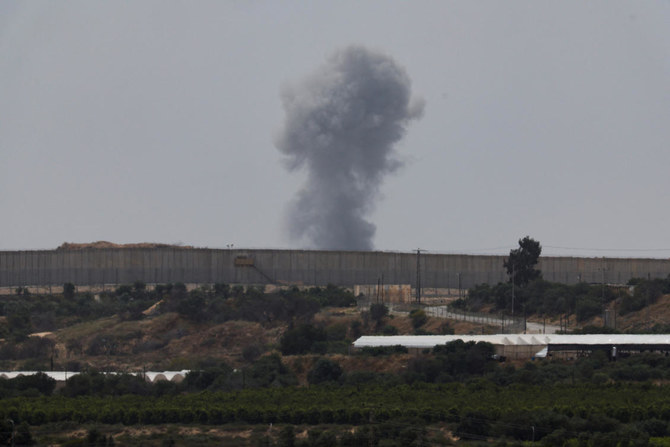
“It is with deep sadness and horror that we learn of the death of our colleague Abdallah Nabhan (33) and his seven-year-old son Jamal, last night, following a bombardment by the Israeli army in the eastern part of the city of Rafah,” the minister said in a statement.
Ukraine, Russia exchange fire, at least seven dead
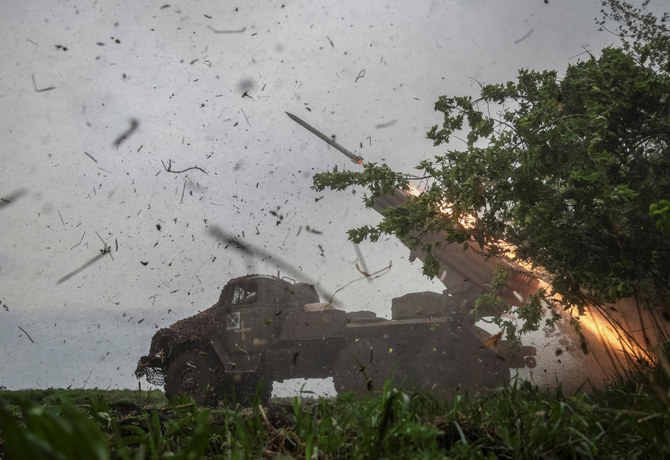
A Ukrainian attack drone left two dead in Zaporizhzhia and two more were killed by Ukranian artillery fire in Kherson
MOSCOW: Ukrainian and Russian forces exchanged drone and artillery fire on Thursday, leaving at least seven dead, regional officials on both sides of the frontline announced.
The uptick in civilian deaths came as Russian forces are pressing in hard in the eastern Donetsk region of Ukraine, ahead of events in Moscow on May 9, hailing the Soviet Union's victory in World War II.
A Ukrainian attack drone left two dead in the southern region of Zaporizhzhia and two more were killed by Ukranian artillery fire in the southern Kherson region, officials said.
The Kremlin claimed to have annexed both regions in late 2022 even though Russian forces are still battling to gain full control over them.
"A man and a woman were killed as a result of a strike on a civilian car. Their four young children were orphaned," the Russian-installed head of Zaporizhzhia, Evgeny Balitsky, wrote on social media.
He said the children would be taken into care and provided with psychological assistance.
The Russian head of the Kherson region, Vladimir Saldo, said separately that two more people were killed by Ukrainian fire in the village of Dnipryany.
The two frontline regions saw intense bouts of fighting in 2022 and the summer of 2023, when Ukraine launched a counteroffensive that failed to meet expectations in Zaporizhzhia.
The brunt of the fighting has since moved to the eastern Donetsk region, which is also claimed by Moscow as Russian territory.
The Ukrainian head of the Donetsk region, Vadim Filashkin, said three people had been killed in separate bouts of shelling in the villages of Udachne, where two people were killed, and in Kurakhivka, where one person was killed.
"The final consequences of the shelling have yet to be determined," he said.
Keralites in Gulf take ‘vote flights’ to join India’s mammoth polls
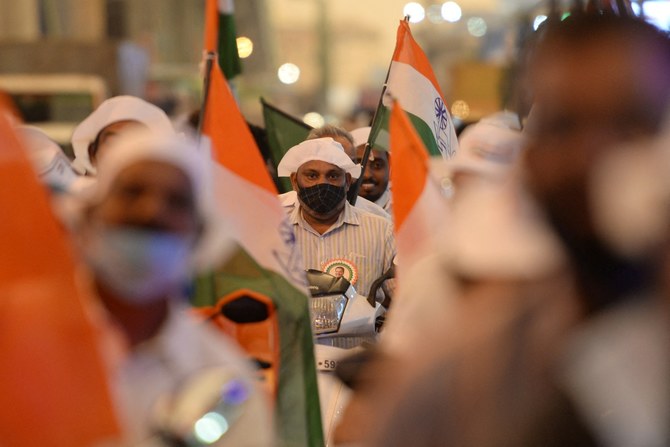
- ‘Vote flights’ are special chartered flights bringing Keralites home to cast ballots
- Kerala is the single main place of origin of Indian expats living in Gulf countries
NEW DELHI: Tens of thousands of Keralites working in Gulf countries are flying home to cast their ballots as the southern Indian state opens for voting on Friday in the world’s biggest general election.
India’s seven-phase polls started on April 19 and take place over the next six weeks, with more than 968 million people registered to vote.
Some states are completing the process in a day, and others have it spread out in several phases. Kerala is joining other 12 states, which according to the schedule go to the polls on April 26.
Indian nationals living overseas have been allowed to vote since 2011 and have to register with both the Election Commission of India and Indian embassies in their countries of residence. Their names will then appear on the voters’ list, but to cast their ballots, they still need to be physically present in their constituencies.
India has one of the world’s largest diasporas, especially in GCC countries, where at least 9 million Indian expats live and work. The southwestern coastal state of Kerala is the single main place of their origin. Some 3.5 million Keralites reside in Saudi Arabia, Oman, Kuwait, Qatar, Bahrain and the UAE.
“I think about 30,000 people have come from Saudi Arabia alone to vote. Not all of them have come on ‘vote viman’ (vote flights). Some have also come by regular flights,” said Iqbal Cheri, a marketing professional working in Dammam, who reached Kerala on Thursday.
Cheri referred to the flights that have been bringing citizens home to participate in Friday’s polls.
“They bring voters only and they are mostly chartered flights,” he said. “We have come here to vote and save our democracy and secularism. It’s an important election and we all need to vote to save the nation.”
His compatriot, Shareef Chola Paramdil, who works as a marketing head of a hospital in Dammam, said these election flights have been bringing Saudi Arabia-based Kerala voters home for the past few days.
“Last week, also three chartered flights came from Saudi Arabia,” he said.
“People who come on the chartered flights pay less compared to the regular flights, as group booking brings down the fare. Besides, these people don’t get more than a few days of leave. So, they come and cast their votes and leave the next day.”
There are 543 contested seats in the lower house of parliament. The party or coalition that wins at least 272 is going to form the government. The state of Kerala will contribute 20.
For Paramdil, the election is particularly important as a Muslim because incumbent Prime Minister Narendra Modi and his ruling Bharatiya Janata Party have been accused by the opposition and minority groups of marshaling majoritarian Hindu sentiment.
Critics say that India’s tradition of diversity and secularism has been under attack since Modi took power a decade ago and that his party has been fostering religious intolerance and discrimination.
“We want a government that does not discriminate in the name of religion, and we have been troubled by the politics of division that the government in Delhi has been practicing ever since it came to power in 2014,” Paramdil said.
Both Keralite Muslims and Hindus — like Gokul Padnabhan, a Kuwait-based professional in the oil and gas industry — see the election as an important exercise of their democratic rights.
“It’s very important to be here this time. That’s why I came for the vote,” Padnabhan said. “The vote will help us find the right person to rule us for the next five years.”
One of the organizations helping expat voters charter flights in Gulf countries is the Kerala Muslim Cultural Centre, an overseas wing of the Indian Union Muslim League.
“I feel around 100,000 people have come from the Gulf region to vote in this election,” said Ahamed Saju, head of the IUML’s student federation.
“Why they came is because this is a very crucial election this time ... Each and every vote is important. So, they thought that this time to protect our democracy, protect our constitution, protect our values and protect our secular credentials and the secular fabric of the country.”
Bangladeshis pray for rain as heatstroke deaths rise
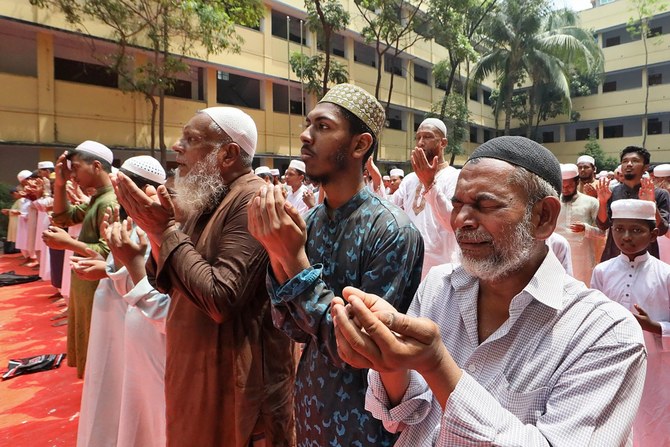
- Country is reaching limit of adaptability to extreme weather, report warns
- Heatwave has shut schools for 33m Bangladeshi children
DHAKA: Thousands of Bangladeshis have gathered in Dhaka to pray for rain in the middle of an extreme hot spell that has put health authorities on heatstroke alert.
The weather across the region is usually hot across the region in April before the summer monsoon season, but this year temperatures have been unusually high, reaching 42 degrees Celsius in parts of Bangladesh.
The country has been on alert since last week, as the punishing heatwave has disrupted agriculture, raised the risk of health complications and forced schools to close for 33 million children.
As the Bangladesh Meteorological Department renewed its warning that the heatwave is likely to persist during the weekend — or until a new notice is issued — thousands of people in Dhaka prayed on Wednesday and Thursday for relief.
They gathered in city mosques and rural fields to pray for rain.
“Special prayers for rain have been organized in many parts of Dhaka on Thursday. Thousands of people joined these prayers ... in addition to that, a special prayer for rain, which Muslims around the world have practiced since the days of the Prophet Muhammad, has taken place in many parts across the country,” Motiur Rahman Akand, spokesperson of the Bangladesh Jamaat-e-Islami, the country’s largest religious political party, which organized the prayers, told Arab News.
“When there is a natural crisis, especially drought, which causes severe suffering for human beings and all other living creatures, people should seek help from the Almighty to get relief from this situation.”
Hospitals were on high alert as at least 20 people died from heatstroke in the past five days alone.
“We have been preparing quite ahead for managing heatwave-related patients ... all the government health facilities are guided not to admit any other patients unless it’s an emergency,” Dr. Moinul Ahsan, director of the hospital wing of the Directorate General of Health Services, told Arab News.
“We are on alert and monitoring the situation closely. Working-class people are suffering most amid this heatwave ... children, pregnant women and the elderly are also most vulnerable in this situation.”
Bangladesh’s geography and low-lying delta topography make it particularly vulnerable to the adverse effects of climate change, and for the past two decades, the country has launched various environmental schemes to mitigate the worsening situation.
Ranking among the 10 countries most prone to climate devastation, Bangladesh has been recognized as a global leader in adaptation and resilience, and in 2005 was one of the first least-developed countries to launch a national adaptation program of action.
A report released in February by the International Centre for Climate Change and Development, a leading research institute in Dhaka, warned that Bangladesh is reaching the limit of its ability to adapt to extreme weather.
Turkiye offers Iraq technical help to bolster border security
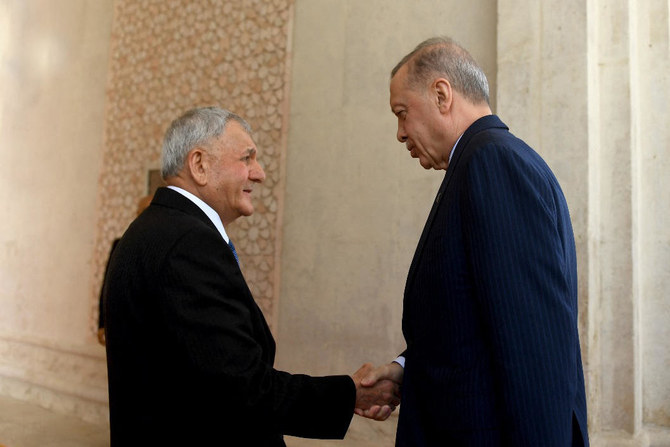
- A delegation from Iraq earlier visited Turkiye to examine the border security systems that Turkiye offered to provide
- Discussions for security cooperation still under way
ANKARA: Turkiye is in discussions with Iraq to provide technical assistance to Baghdad for securing its borders to prevent movements of outlawed Kurdistan Workers Party (PKK) militants around the region, a Turkish defense ministry official said on Thursday.
Turkish President Tayyip Erdogan visited Baghdad and Irbil this week as Ankara ramped up cross-border operations against PKK militants based in mountainous, mainly Kurdish northern Iraq.
The two countries agreed to a strategic framework agreement overseeing security, trade and energy as well as a defense cooperation deal during the visit.
“We told our counterparts that Turkiye is ready to provide assistance to Iraq on border security systems,” the Turkish official told reporters.
A delegation from Iraq earlier visited Turkiye to examine the border security systems that Turkiye offered to provide, the official also said, adding that the discussions for security cooperation were still under way.
During a joint press conference with Erdogan on Monday, Iraqi Prime Minister Mohammed Shia Al-Sudani said the two countries would cooperate to bolster border security, without mentioning the PKK specifically.
The PKK took up arms against the Turkish state in 1984 and is designated a terrorist organization by Ankara and its Western allies. Turkiye has conducted a series of cross-border operations against the group in northern Iraq since 2019.



